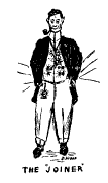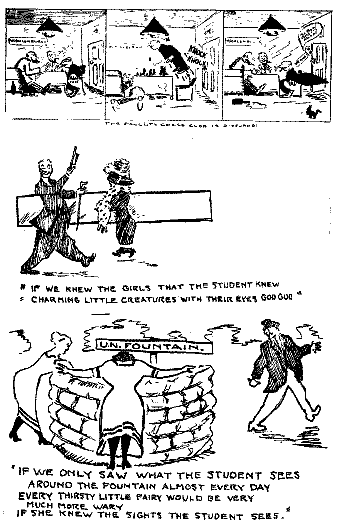

|
In The Good Old Summer Time
The grass forms a velvety mat beneath
the trees, green with their heaviest foliage. Flowers in
their brightest bloom nod to each other in the warm breezes.
Two solemn persons creep snail-like in at the south gate.
They pause before the fountain as if to count their beads.
Wrapped in melancholy thoughts they sit for a moment upon
one of the benches, to breathe the rich fragrance of
summer's perfumed air, while the birds make sport of their
drollery. The warm sunbeams and depressing atmosphere, so
inspiring to these little creatures close to nature, have
deprived mankind of all animation.
Soon these two are gone and the Campus is
left to its own solitude. The streams of hurrying students
have ceased to flow from one building to another. Even the
halls of the central structure, once so crowded, feel only
the scamper of unmolested mice. The worn walks are resting
from winter's weary labors, and the Library Steps are
vacant. The Fountain goes unpatronized, and the Sun Dial
performs its task unnoticed. The gongs have stopped
announcing the opening and closing of recitation hours, and
the sound of typewriters in the Rag office is heard no more.
The stillness is broken only by the birds as they scold some
landscape gardener lazily performing his little tasks. Night
comes and with it a silence more pronounced. The Light on
the Tower, feeling its efforts unappreciated, joins the
inaudible colloquy of the other campus ornaments as they vie
with each other in relating the history of Nebraska, each
using itself as the central figure. The University is here,
but that is all. Like a stuffed animal it is lifelike in its
appearance, but lifeless in its being. The inanimate body is
slumbering till the soul returns.
 S.
0. C. S.
0. C.
The Temple
"Why do they call that handsome
building the Temple?" inquired a stranger, pointing to the
structure in question.
The student to whom the query was
addressed assumed one of those disgusted, "I'd
like-to-kick-my-best-friend" expressions, and delivered the
following concise and illuminating explanation:
"Because it's the sanctuary of a religious
organization and is presided over by a janitor whose powers
make those of a high priest resemble those of a gent with a
suffragette wife."
But I thought it was built for the benefit
of all the students of this large and growing institution."
pursued the stranger.
"That was the alleged commendable
intention," replied the student, his peeved demeanor
intensifying. "But like all good intentions it slipped a
cog. The average Student gets to behold the interior of the
Temple perhaps two or three times in the course of his
career, unless he has pronounced Y. M. C. A. tendencies or
is rash enough to face financial ruin by endeavoring to hire
it for some student organization."
The stranger marveled and went away. The
youth who vouchsafed the information stood out in the raw,
biting wind for a moment more in an effort to enjoy a few
puffs at his pipe. And in the meanwhile lads and lassies
alike passed by the imposing marble structure with a look of
longing to enter, mingled with fear of the consequences. The
Janitor, with malicious delight, drove away several students
who had sought the shelter of the columns to smoke their
cigarettes. And thus the Temple passed through its usual
day's routine.
It is sad to contemplate what purpose the
Temple now serves and what purpose it could be made to
serve. It is "indubitable" that it benefits only a small
minority of the students of the University. It is equally
"indubitable" that it could be made to benefit practically
all.
|

 The
JOINER
The
JOINER Prof.
Engberg
Prof.
Engberg



